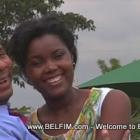Carl Fombrun
Carl Fombrun Biography
I was born in Port-au-Prince, Haiti, June 15, 1932. I am the youngest of 14 children. I had a brother, Lucien, who died when he was a baby, and my mother also had twin boys who died at childbirth. 11 of us survived and three brothers died in the past 18 years. We are 8 left.
Short biography and highlights of Carl Fombrun’s life.
At the end of 1946, at 14 years of age after elementary schooling in Haiti, I was a boarder in Mount St. Charles Academy, Woonsocket, Rhode Island, a Franco-American town.
During my four years in this boarding school I became the Editor of “La Page Francaise,” a champion in ping-pong, American pool table, a participant in the sports of hockey and basketball, and acquired my high school diploma.
My passion was for languages, Haitian and American History, with high marks in the latest.
In 1952 I moved to Havana, Cuba where I lived with my brother Marcel Fombrun who was the ambassador there from Haiti. I followed courses equivalent to 2 years of an American college education.
After 2 years in Cuba I returned to Haiti, and joined a family travel business to subsequently be named Public Relations Officer, Attaché to the head direction.
In October 1955, I was named Attaché to the Haitian Embassy in Panama and later In-Charge of Consulate Affairs in Costa Rica. With the overthrow of the Magloire administration, I resigned and returned to Haiti in December 1956.
On June 15, 1956 a bomb exploded in the middle of the night in the International Casino in Port-au-Prince, killing 17 people. A few days before in this same casino, I was arrested, transported, and tortured in the Fort Dimanche dungeon in the environment of the city, for sitting down and not dancing a meringue dedicated to the dictator-president “papa doc” Francois Duvalier.
The Fombrun brothers were accused of this deed by the goons of the regime. On my birthday, June 15, 1959, I took refuge, with my two brothers Marcel and Alix, in the Mexican embassy in Haiti.
After one month as political refugees in the Mexican embassy, we left Haiti July 16, 1959 to go to Castro’s Cuba where another brother, Lionel, was a resident. From there, we continued to Mexico where I lived for 6 months and returned to the United States of America end of December 1959.
After 12 years of exile I visited Haiti many times under the regime of Jean-Claude Duvalier, while keeping my residential statute in the U.S.
I have traveled about in North America, South America, Africa, Australia, Tahiti, and the Caribbean.
During my adult life in the U.S., I have been in customer service and public relation for different airlines such as Swissair, Air France, TWA, Eastern, and BWIA. Although a naturalized American citizen since 1963, I have considered myself for a long time in this great country, a political refugee, and not an immigrant. Time has moved on, and finally I am now a full-fledged U.S. citizen.
Today, spontaneously, I am in the theater, movies, newspapers, and the radio. A man of all medias, known for his chronique, “Carl’s Corner Speaking About Everything and Nothing,” in Radio Carnivale, Haitian and Cuban television in Miami. I have a certificate from Miami City Hall and other awards for services rendered to the community.
I am fluent in the French, English, Spanish, and Creole languages and have given myself a year to understand Portuguese.
Principal actor in the movie “Lords of Miami” due to come out this summer, I have no false modesty in this role.
I participated in the theater last January 1st., 2004 in the play “Endepandans,” as Alexandre Pétion, first president of Haiti. A large crowd of Haitians and foreigners estimated at approximately 5000 people attended this premiere in the James L. Knight Center in downtown Miami. This play was produced by Dr. Bob Lapierre Pardo.
November 18, 2003, I was a lecturer at Florida International University North Campus, taking part in a debate on the Battle of Vertières.
What is most important in this World, is to have a joy for life, to be active and to avoid anything in any way which looks like hate. At the same time, to be worthy and proud of oneself and give to the coming generations, which are mostly children of immigrants, confidence in their destiny, the United States of America, where they have the opportunity to succeed.


 Haiti actress Ginou Mondesir, memories of her violent death resurfaces in the aftermath of Nice Simon's domestic violence case
Haiti actress Ginou Mondesir, memories of her violent death resurfaces in the aftermath of Nice Simon's domestic violence case